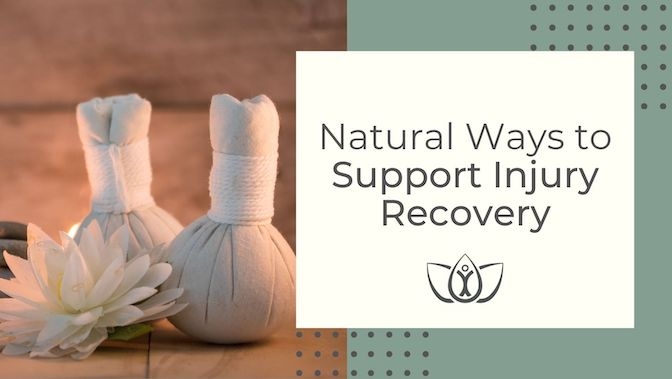Introduction
Injuries like sprains, strains, scrapes, or bruises detract from your wellness—whether through swelling, inflammation, or ongoing irritation. Getting back to normal can be a long process as the body works to repair itself, but our bodies are also powerful and have incredible natural resources for recovery. However, if an injury isn’t healing properly on its own or worsens, always consult a healthcare practitioner.
When dealing with injuries, it is important to take a whole-person approach to support the body through the healing process. By focusing on more than just pain relief and striving to make good decisions for your mental, emotional, and physical wellness, you’ll be able to handle an injury better.
Eat Nutrient-Rich Foods
A good diet is the cornerstone of holistic wellness. Many of the nutrients required to support our bodies during recovery come from our dietary choices. Here are just a few items to make sure you’re incorporating into your meals daily:
- Protein: Commonly found in lean meat, nuts, and eggs, protein is essential to building muscle mass. To help make your body stronger after it has been damaged, you can eat more protein-heavy foods to support the natural restoration and healing process.
- Fatty Acids: Healthy oils and fats can aid recovery, especially if you’re struggling with inflammation and discomfort. Omega-3s are anti-inflammatory fats that lubricate your joints and help mend tissue damage. To ensure you get a healthy amount of omega-3s, eat plenty of oily fish, flaxseed, and nuts.
- Fruits & Veggies: When it comes to fruits and vegetables, the more color in your diet, the better. Vibrant hues usually mean high vitamin and mineral content.
- Peppers, tomatoes, and apricots provide vitamin A.
- Antioxidants and vitamin C can be found in dark berries like blueberries and elderberries.
- Broccoli, kale, and spinach have high levels of vitamin E and zinc.
- Turmeric & Ginger: To encourage faster recovery and help reduce pain, anti-inflammatory herbs like turmeric and ginger make a great addition to your diet. You can take these supplements in capsule form or incorporate them naturally into your meals. Speak with a healthcare practitioner to determine if these supplements are right for you and the best amount to take.
By taking the time to learn what your body needs and giving it plenty of nutrients, you will be more prepared to overcome injuries that are keeping you from living fully.
Rest & Relax
The most important thing to remember during the healing process is that your body needs time. If you push your limits and do too much before you’re ready, you could end up reversing your recovery or doing even more damage. Be sure to rest well and let your body do its reparative work.
To encourage relaxation and support your well-being, try getting a massage, going to a chiropractor, or visiting an acupuncturist. All of these practices can be tailored to your specific needs and recovery stages—and ultimately help you feel refreshed not just physically but also emotionally and mentally.
As you’re resting, hot or cold compresses on your injury may also relieve pain and reduce inflammation. Many people have differing opinions on whether hot or cold is best—and the answer depends on your injury. For sore joints or muscles, alternating hot and cold compresses can have positive effects. For injuries with excessive swelling, like a sprain, using ice is typically best.
If you need a little help relaxing, you can try Epsom salt baths for sore muscles. You can also incorporate essential oils that are suitable for clearing the mind and reducing tension, such as lavender, rose, bergamot, or clary sage. Speak with a qualified practitioner to determine which essential oils are safe for you or anyone else you’re working with to use.
Practice Mindfulness
Your brain is the most powerful organ in your body. Keeping a healthy mindset during recovery can improve your outlook. Activities like meditation and yoga, adapted to your limitations as required, can clear your head and prevent you from focusing solely on your pain and injury. Plus, the simple movements and mild stretches of yoga or tai chi allow you to slowly regain a normal range of motion and evaluate your physical capabilities while helping you relax.
Take intentional time to focus on your recovery and visualize your healing. You can also consult a healthcare practitioner to determine what steps to take next and help create your recovery goals as required. For injuries that result in distress and emotional upset, seek out a mental health professional for support. With these tools and supports, you can create concrete objectives for your recovery—and renew your motivation to overcome your injury.
Conclusion
Supporting your whole body through the process of recuperation will help you take a more holistic approach to your wellness. By focusing on your mental and emotional well-being in addition to your physical health, with support from health and wellness professionals as needed, you can feel better and maintain a positive mindset.
If you want to support others to avoid injuries while exercising and pursue complete wellness, consider obtaining a certification in holistic fitness. The Certified Holistic Fitness Specialist program at Trinity School of Natural Health will give you the tools you need to encourage others on their wellness journeys, empower them to make healthier decisions, and learn about proper body mechanics to help avoid injuries. Contact an enrollment specialist today at 800-428-0408, option 2, or visit our website at trinityschool.org/program/chfs to learn more.
Are you ready to start your Trinity Experience? Watch our *FREE* Trial Class to learn more about nutrition and how our courses are structured!


